- Home
- Joseph Conrad
Youth, a Narrative Page 3
Youth, a Narrative Read online
Page 3
raft. But wewent. The house was shattered as if a shell had exploded inside. Mostof it had gone overboard--stove, men's quarters, and their property,all was gone; but two posts, holding a portion of the bulkhead to whichAbraham's bunk was attached, remained as if by a miracle. We groped inthe ruins and came upon this, and there he was, sitting in his bunk,surrounded by foam and wreckage, jabbering cheerfully to himself. Hewas out of his mind; completely and for ever mad, with this sudden shockcoming upon the fag-end of his endurance. We snatched him up, lugged himaft, and pitched him head-first down the cabin companion. You understandthere was no time to carry him down with infinite precautions and waitto see how he got on. Those below would pick him up at the bottom ofthe stairs all right. We were in a hurry to go back to the pumps. Thatbusiness could not wait. A bad leak is an inhuman thing.
"One would think that the sole purpose of that fiendish gale had been tomake a lunatic of that poor devil of a mulatto. It eased before morning,and next day the sky cleared, and as the sea went down the leak took up.When it came to bending a fresh set of sails the crew demanded to putback--and really there was nothing else to do. Boats gone, decks sweptclean, cabin gutted, men without a stitch but what they stood in, storesspoiled, ship strained. We put her head for home, and--would you believeit? The wind came east right in our teeth. It blew fresh, it blewcontinuously. We had to beat up every inch of the way, but she didnot leak so badly, the water keeping comparatively smooth. Two hours'pumping in every four is no joke--but it kept her afloat as far asFalmouth.
"The good people there live on casualties of the sea, and no doubt wereglad to see us. A hungry crowd of shipwrights sharpened their chiselsat the sight of that carcass of a ship. And, by Jove! they had prettypickings off us before they were done. I fancy the owner was already ina tight place. There were delays. Then it was decided to take partof the cargo out and calk her topsides. This was done, the repairsfinished, cargo re-shipped; a new crew came on board, and we wentout--for Bankok. At the end of a week we were back again. The crew saidthey weren't going to Bankok--a hundred and fifty days' passage--in asomething hooker that wanted pumping eight hours out of the twenty-four;and the nautical papers inserted again the little paragraph: _'Judea_.Barque. Tyne to Bankok; coals; put back to Falmouth leaky and with crewrefusing duty.'
"There were more delays--more tinkering. The owner came down for a day,and said she was as right as a little fiddle. Poor old Captain Beardlooked like the ghost of a Geordie skipper--through the worry andhumiliation of it. Remember he was sixty, and it was his first command.Mahon said it was a foolish business, and would end badly. I loved theship more than ever, and wanted awfully to get to Bankok. To Bankok!Magic name, blessed name. Mesopotamia wasn't a patch on it. Remember Iwas twenty, and it was my first second mate's billet, and the East waswaiting for me.
"We went out and anchored in the outer roads with a fresh crew--thethird. She leaked worse than ever. It was as if those confoundedshipwrights had actually made a hole in her. This time we did not evengo outside. The crew simply refused to man the windlass.
"They towed us back to the inner harbour, and we became a fixture, afeature, an institution of the place. People pointed us out to visitorsas 'That 'ere bark that's going to Bankok--has been here six months--putback three times.' On holidays the small boys pulling about in boatswould hail, '_Judea_, ahoy!' and if a head showed above the railshouted, 'Where you bound to?--Bankok?' and jeered. We were only threeon board. The poor old skipper mooned in the cabin. Mahon undertookthe cooking, and unexpectedly developed all a Frenchman's genius forpreparing nice little messes. I looked languidly after the rigging. Webecame citizens of Falmouth. Every shopkeeper knew us. At the barber'sor tobacconist's they asked familiarly, 'Do you think you will ever getto Bankok?' Meantime the owner, the underwriters, and the chartererssquabbled amongst themselves in London, and our pay went on.... Passthe bottle.
"It was horrid. Morally it was worse than pumping for life. It seemed asthough we had been forgotten by the world, belonged to nobody, would getnowhere; it seemed that, as if bewitched, we would have to live for everand ever in that inner harbour, a derision and a by-word to generationsof long-shore loafers and dishonest boatmen. I obtained three months'pay and a five days' leave, and made a rush for London. It took me a dayto get there and pretty well another to come back--but three months'pay went all the same. I don't know what I did with it. I went to amusic-hall, I believe, lunched, dined, and supped in a swell place inRegent Street, and was back to time, with nothing but a complete set ofByron's works and a new railway rug to show for three months' work. Theboatman who pulled me off to the ship said: 'Hallo! I thought you hadleft the old thing. _She_ will never get to Bankok.' 'That's all _you_know about it,' I said scornfully--but I didn't like that prophecy atall.
"Suddenly a man, some kind of agent to somebody, appeared with fullpowers. He had grog-blossoms all over his face, an indomitable energy,and was a jolly soul. We leaped into life again. A hulk came alongside,took our cargo, and then we went into dry dock to get our copperstripped. No wonder she leaked. The poor thing, strained beyondendurance by the gale, had, as if in disgust, spat out all the oakum ofher lower seams. She was recalked, new coppered, and made as tight as abottle. We went back to the hulk and re-shipped our cargo.
"Then on a fine moonlight night, all the rats left the ship.
"We had been infested with them. They had destroyed our sails, consumedmore stores than the crew, affably shared our beds and our dangers, andnow, when the ship was made seaworthy, concluded to clear out. I calledMahon to enjoy the spectacle. Rat after rat appeared on our rail, tooka last look over his shoulder, and leaped with a hollow thud into theempty hulk. We tried to count them, but soon lost the tale. Mahon said:'Well, well! don't talk to me about the intelligence of rats. They oughtto have left before, when we had that narrow squeak from foundering.There you have the proof how silly is the superstition about them. Theyleave a good ship for an old rotten hulk, where there is nothing to eat,too, the fools!... I don't believe they know what is safe or what isgood for them, any more than you or I.'
"And after some more talk we agreed that the wisdom of rats had beengrossly overrated, being in fact no greater than that of men.
"The story of the ship was known, by this, all up the Channel fromLand's End to the Forelands, and we could get no crew on the southcoast. They sent us one all complete from Liverpool, and we left oncemore--for Bankok.
"We had fair breezes, smooth water right into the tropics, and theold Judea lumbered along in the sunshine. When she went eight knotseverything cracked aloft, and we tied our caps to our heads; but mostlyshe strolled on at the rate of three miles an hour. What could youexpect? She was tired--that old ship. Her youth was where mine is--whereyours is--you fellows who listen to this yarn; and what friend wouldthrow your years and your weariness in your face? We didn't grumble ather. To us aft, at least, it seemed as though we had been born in her,reared in her, had lived in her for ages, had never known any othership. I would just as soon have abused the old village church at homefor not being a cathedral.
"And for me there was also my youth to make me patient. There was allthe East before me, and all life, and the thought that I had been triedin that ship and had come out pretty well. And I thought of men of oldwho, centuries ago, went that road in ships that sailed no better, tothe land of palms, and spices, and yellow sands, and of brown nationsruled by kings more cruel than Nero the Roman and more splendid thanSolomon the Jew. The old bark lumbered on, heavy with her age and theburden of her cargo, while I lived the life of youth in ignorance andhope. She lumbered on through an interminable procession of days; andthe fresh gilding flashed back at the setting sun, seemed to cry outover the darkening sea the words painted on her stern, '_Judea_, London.Do or Die.'
"Then we entered the Indian Ocean and steered northerly for Java Head.The winds were light. Weeks slipped by. She crawled on, do or die, andpeople at home began to think of posting us as overdue.
"One Saturday evening,
I being off duty, the men asked me to give theman extra bucket of water or so--for washing clothes. As I did not wishto screw on the fresh-water pump so late, I went forward whistling, andwith a key in my hand to unlock the forepeak scuttle, intending to servethe water out of a spare tank we kept there.
"The smell down below was as unexpected as it was frightful. One wouldhave thought hundreds of paraffin-lamps had been flaring and smoking inthat hole for days. I was glad to get out. The man with me coughed andsaid, 'Funny smell, sir.' I answered negligently, 'It's good for thehealth, they say,' and walked aft.
"The first thing I did was to put my head down the square of the midshipventilator. As I lifted the lid a visible breath,

 Heart of Darkness
Heart of Darkness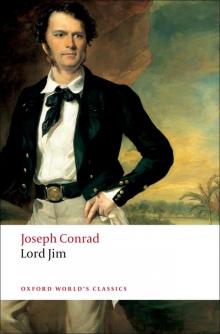 Lord Jim
Lord Jim The Nigger of the Narcissus (Echo Library)
The Nigger of the Narcissus (Echo Library) Victory (Dover Thrift Editions)
Victory (Dover Thrift Editions) Secret Agent
Secret Agent Nostromo
Nostromo Chance: A Tale in Two Parts
Chance: A Tale in Two Parts Youth
Youth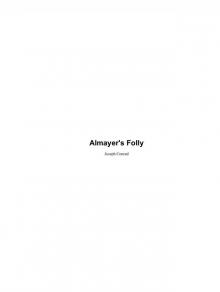 Almayer's Folly
Almayer's Folly The Heart of Darkness and the Secret Sharer
The Heart of Darkness and the Secret Sharer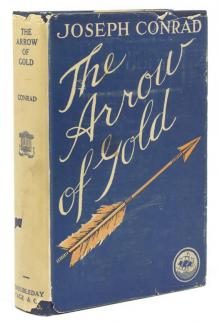 The Arrow of Gold: A Story Between Two Notes
The Arrow of Gold: A Story Between Two Notes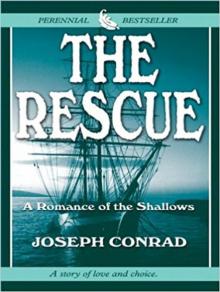 The Rescue: A Romance of the Shallows
The Rescue: A Romance of the Shallows The Point Of Honor: A Military Tale
The Point Of Honor: A Military Tale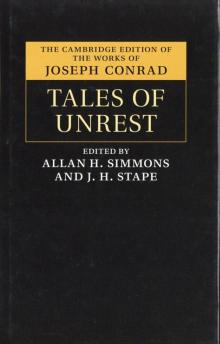 Tales of Unrest
Tales of Unrest Under Western Eyes
Under Western Eyes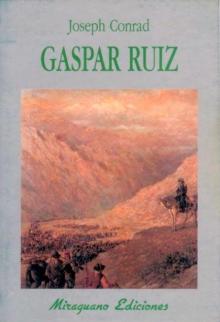 Gaspar Ruiz
Gaspar Ruiz A Set of Six
A Set of Six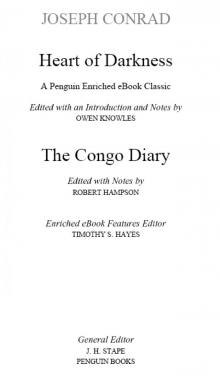 Heart of Darkness and the Congo Diary (Penguin Classics)
Heart of Darkness and the Congo Diary (Penguin Classics) Heart of Darkness and Selected Short Fiction
Heart of Darkness and Selected Short Fiction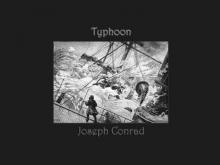 Typhoon
Typhoon Youth, a Narrative
Youth, a Narrative Tomorrow
Tomorrow The Arrow of Gold
The Arrow of Gold The Shadow Line: A Confession
The Shadow Line: A Confession The Rescue
The Rescue Victory (Echo Library)
Victory (Echo Library) The Brute
The Brute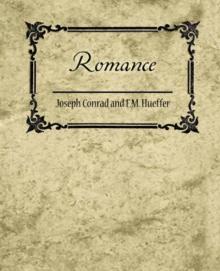 Romance
Romance A Personal Record
A Personal Record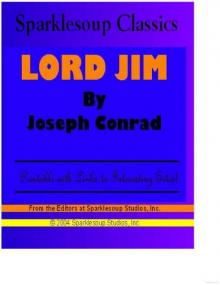 Lord Jim: A Tale
Lord Jim: A Tale Heart of Darkness and Selected Short Fiction (Barnes & Noble Classics Series)
Heart of Darkness and Selected Short Fiction (Barnes & Noble Classics Series) Within the Tides
Within the Tides The Secret Sharer and Other Stories
The Secret Sharer and Other Stories Falk
Falk Heart of Darkness and The Secret Sharer
Heart of Darkness and The Secret Sharer Chance
Chance An Anarchist
An Anarchist The Secret Agent: A Simple Tale
The Secret Agent: A Simple Tale The Secret Agent
The Secret Agent Complete Works of Joseph Conrad (Illustrated)
Complete Works of Joseph Conrad (Illustrated)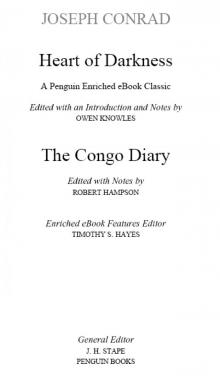 Heart of Darkness and the Congo Diary
Heart of Darkness and the Congo Diary Notes on Life & Letters
Notes on Life & Letters Typhoon (Single Story)
Typhoon (Single Story)